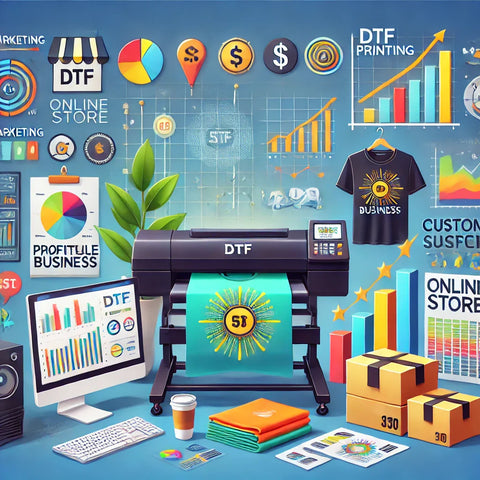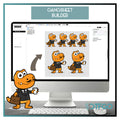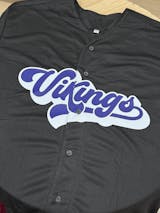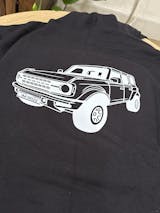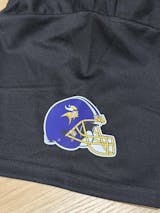Starting your own online brand is an exciting opportunity to turn your passion into a profitable business. Whether you’re launching a clothing line, custom printed products, handmade goods, or digital services, a strong brand and the right e-commerce strategy are key to success.
But how do you start? What platforms should you use? How do you stand out in a competitive market?
In this guide, we’ll walk you through the step-by-step process of building your own brand and selling online effectively.
1. Why Build Your Own Brand?
✔ Full Control – You set your own prices, brand identity, and customer experience.
✔ Higher Profit Margins – Selling through your own store means no third-party commission fees.
✔ Long-Term Business Growth – A recognizable brand builds trust and repeat customers.
✔ Scalability – You can expand your product line, reach international customers, and grow sustainably.
📌 Example: A small print-on-demand business can grow into a full-scale apparel brand with the right branding and marketing.
🚀 Pro Tip: Building a brand takes time, but a loyal customer base leads to sustainable success in e-commerce.
2. Step-by-Step Guide to Starting Your Own Brand Online
Let’s break down the essential steps to create, launch, and scale your brand.
1️⃣ Choose a Niche & Business Model
The first step is to define your niche and decide how you will sell products.
✔ Pick a Niche – Choose a specific market where you can stand out (e.g., sustainable fashion, pet accessories, gaming merch, custom prints).
✔ Decide on a Business Model:
- Print-on-Demand (POD) – No inventory, great for apparel & accessories.
- Dropshipping – Sell without holding stock; supplier handles fulfillment.
- Handmade Products – Ideal for jewelry, crafts, and custom gifts.
- Private Labeling – Customize pre-made products with your own branding.
📌 Example: If you love graphic design, start a DTF print store and sell custom-printed t-shirts and hoodies.
🚀 Pro Tip: Focus on a passionate niche with demand and low competition.
2️⃣ Create Your Brand Identity
A strong brand identity makes your business memorable and professional.
✔ Choose a Unique Brand Name – Keep it short, catchy, and easy to remember.
✔ Design a Logo & Brand Colors – Use free tools like Canva or Looka.
✔ Define Your Brand Story – Why did you start? What makes you different?
✔ Select Your Target Audience – Define who your ideal customers are.
📌 Example: If your niche is fitness apparel, create a bold, energetic brand that appeals to active lifestyles.
🚀 Pro Tip: Maintain consistent branding across your website, packaging, and social media.
3️⃣ Set Up Your Online Store
Now, it’s time to build your online shop!
✔ Best Platforms for E-Commerce:
- Shopify – Best for beginners with easy customization.
- Etsy – Great for handmade & niche products.
- WooCommerce – Ideal if you prefer WordPress-based stores.
- Amazon & eBay – Good for reaching a wider audience.
✔ Essential Store Setup Steps:
- Pick a mobile-friendly store theme.
- Set up product categories, pricing, and descriptions.
- Configure payment gateways (PayPal, Stripe, Shopify Payments).
- Add customer reviews & testimonials for social proof.
📌 Example: A Shopify store selling print-on-demand streetwear with DTF transfers can be launched in a few days with minimal costs.
🚀 Pro Tip: Optimize your store for fast loading speeds and mobile shoppers.
4️⃣ List & Optimize Your Products
✔ Upload High-Quality Product Images – Use mockups or professional photography.
✔ Write Compelling Product Descriptions – Highlight benefits, materials, and sizing.
✔ Set Competitive Pricing – Research competitors and find the best price point.
✔ Use SEO-Friendly Titles – Example: “Custom DTF Printed Hoodie – Soft & Durable.”
📌 Example: Instead of "Black T-shirt", use "Premium Black Cotton T-Shirt – Soft & Lightweight for Everyday Wear" to boost search visibility.
🚀 Pro Tip: Optimize alt text & filenames for Google Image Search (e.g., custom-dtf-printed-shirt.webp).
5️⃣ Market & Promote Your Brand Online
Your store is live—now bring traffic and customers!
✔ Social Media Marketing – Use Instagram, TikTok, Pinterest, and Facebook to showcase your products.
✔ Influencer Collaborations – Partner with micro-influencers to expand your reach.
✔ SEO for E-Commerce – Optimize your product pages & blog for organic traffic.
✔ Email Marketing – Collect customer emails and send exclusive discounts.
✔ Paid Ads – Run Facebook & Google Ads for targeted sales.
📌 Example: A small clothing brand can gain traction through Instagram Reels & TikTok videos showcasing product details and behind-the-scenes content.
🚀 Pro Tip: Use UGC (User-Generated Content) to build brand trust and encourage customer engagement.
6️⃣ Automate & Scale Your Business
Once your business gains traction, focus on growth and automation.
✔ Automate Order Fulfillment – Use Printful, Printify, or ShipStation.
✔ Outsource Tasks – Hire freelancers for design, marketing, and customer support.
✔ Launch New Product Lines – Introduce seasonal items or bundle offers.
✔ Retarget Existing Customers – Use email marketing & SMS campaigns.
📌 Example: If your first collection sells well, launch limited edition designs or offer personalized options to boost repeat sales.
🚀 Pro Tip: The key to long-term success is keeping your brand fresh & relevant.
Final Thoughts: Launch & Grow Your Online Brand
Starting your own online brand is more than just selling products—it’s about creating a unique identity that customers love and trust.
📌 Key Takeaways:
✔ Choose a profitable niche and define your brand identity.
✔ Set up a professional online store with optimized product listings.
✔ Market your brand strategically through social media, SEO, and influencers.
✔ Automate and scale to maximize profits and reduce workload.
🚀 Ready to start your e-commerce journey? Follow these steps and turn your brand into a successful online business!



